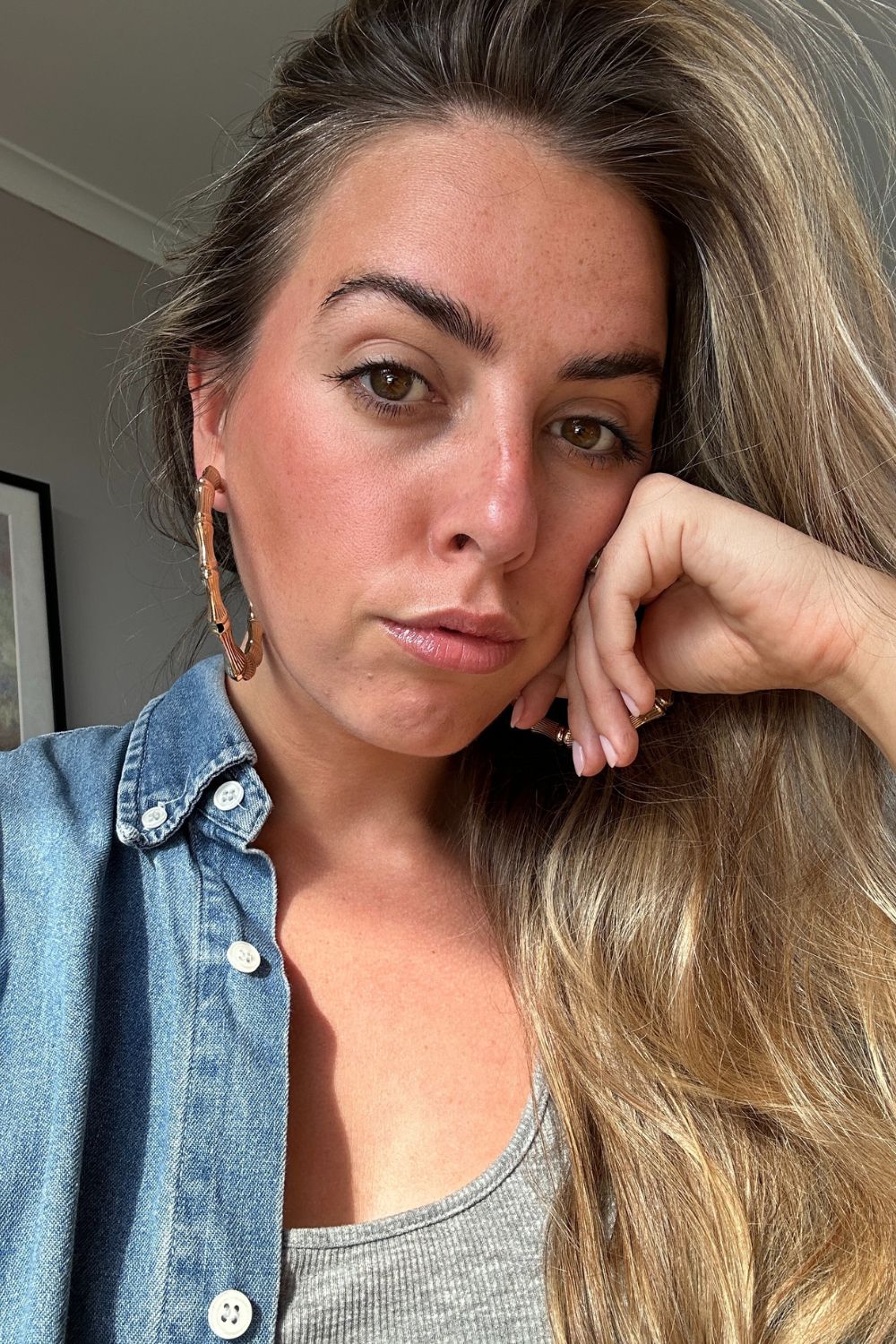
Throughout my time as a beauty editor I have picked up a fair amount of expert advice on how to fend off hair breakage—mainly out of personal interest. You see, my hair is super-long, super-fine and super-bleached, and these three things are a recipe for split ends and breakage. Why? Because long hair is prone to knotting and snapping, fine hair is naturally more fragile and the process of bleaching hair breaks down and weakens the hair bonds that keep strands, well, strong.
Over the years, I have tried every strengthening hair product out there—from bond-restoring treatments and nourishing hair masks to hair oils and thickening shampoos—and truthfully, I've never found the product for the job. This summer, however, I found my hair in dire straits. After my wedding hair routine left my hair over-processed and my honeymoon turned my strands UV-damaged, chlorine-damaged, dry and brittle, I turned to drastic measures. And after a lot of trial and error, I have finally realised that tackling breakage isn't a case of relying on one product alone but carefully editing your entire routine. Since adopting this routine (and the following products) my hair looks the healthiest, longest, fullest and glossiest it has ever looked.

And because I appreciate just how laborious it is to figure these sorts of things out for yourself (I'm living proof of that), I figured I'd share my findings with the rest of you, so that you too can live your best breakage-free life. So here it is, my full anti-hair-breakage routine—you can thank me later.
Pre-shampoo treatments
I hate any sort of beauty-related faff as much as the next person, and I'll admit the idea of adding a pre-shampoo treatment into my routine really irked me. I want my hair wash routine to be as simple and fuss-free as possible. And the worst thing is, since I sucked it up and started using pre-shampoo treatments once a week, I have noticed a real difference in the strength and smoothness of my hair.
The thing I do like about this step, however (besides just the results), is that I don't have to sit around in the bath for ages like you might have to with more traditional conditioning hair masks. Instead, you apply them to dry hair, before your wash routine, and let them marinate. It's a truth you need to understand: in order for your hair to experience serious strengthening nourishment, you need to allow some time for products to do their job.
I wouldn't typically dream of touching my fine, limp hair with an oil, but this pre-wash treatment from JVN is really impressive. It uses rosemary oil and the brand's patented sugarcane-derived hemi-squalane to strengthen hair at the root, along with tumeric extract and neem seed oil to soothe any scalp irritation. It leaves my hair looking full of life and noticeably stronger.
I know, I know, £100 for a hair mask?! But hear me out. I have tried so many restructuring pre-shampoo treatments in my time and most of them leave my hair feeling somewhat dry and brittle—but not this stuff. With a rich, balmy texture, it transforms into a nourishing oil when left on hair, providing one of the most luxurious at-home experiences I've ever encountered. It leaves my strands nourished, silky-soft and with a more elastic feel.
Water softeners
I have read (and written) a lot about the damage that hard water can do to your hair and yet, up until a few months ago, I'd never actually taken any steps to deal with it myself. And I live in London, where the water is notoriously hard. Essentially, hard water contains a build-up of minerals that damage hair bonds and prevent moisture from entering the hair shaft. In my case, with every nourishing and strengthening product I used and rinsed out with hard water, I was fighting a losing battle.
To deal with this issue, I invested in a filtering, water-softening showerhead—and the change in the strength of my hair was almost instant. Since using said filters, my hair is softer, smoother and way less prone to breaking and splitting.
Shampoo
I don't need to say too much on this one. Truth be told, shampoo isn't really on your hair long enough to have drastically strengthening results. However, something I have noticed is that the more intense of a cleanse my shampoo delivers, the knottier and drier my hair becomes. Instead, I've been using nourishing shampoos, specifically targeted at softening and nourishing my hair.
Although I appreciate a little luxury when it comes to my haircare, I'll admit I'm a sucker for a great affordable shampoo, too—and this one is just that. It works up into a luxurious lather and doesn't strip the hair, leaving it beautifully soft. Any hint of dry, brittleness is gone whenever I use this stuff.
If my hair is in a particularly dry state, this is the shampoo I lean on. Utilising the power of bond-restoring proteins, it works to make hair stronger from the inside-out—resulting in less breakage, fewer split ends and generally healthier lengths.
Conditioner
Unlike my choice of shampoo, I have found that my choice of conditioner plays a huge role in how susceptible my strands are to breakage. While really nourishing, buttery formulas weigh my fine hair down, lightweight options don't provide enough hydration to keep my lengths smooth and knot-free. This area has taken a lot of trial and error, and I'm pleased to announce I have finally found two 'Goldilocks' conditioners that are just right. My advice? Look for detangling conditioner formulas suited to your hair type (in my case, I need textures that promise not to weight hair down) that also contain certain protein complexes to help restore damage and reverse fragility.
Not only am I somewhat obsessed with the way this bottle of conditioner looks on my shelf, what's inside it pleases me even more. It's wonderfully lightweight, which is just what my fine, flat hair needs for a little extra lift, but beyond that it's really hardworking. Formulated with keratin, it helps to seal and restore split ends, meaning that my hair is left feeling and looking stronger than ever.
I always keep a bottle of this stuff on hand for the summer, when my hair is at its driest and most fragile. It is specially formulated for fine, fragile hair like mine that is prone to breaking as a result. Just one application transforms my lengths.
Scalp treatments
Ask any of my colleagues and they will tell you how passionately I feel about scalp care not being all its cracked up to be. For the most part, I consider targeted scalp products to be a con. But that doesn't mean I'm totally against all forms of scalp care. In fact, I treat myself to an at-home 'scalp facial' once a week. Why? Because it's true that a healthy head of hair that doesn't break starts with a healthy scalp. What isn't true, however, is that at-home, topical scalp products can magically make new strands of hair grow. Hair loss is a very emotional thing to go through, and I don't believe anyone should waste their money on products that simply aren't going to work. If you think you're experiencing hair loss, please book in to see your GP—they'll be able to advise you far better than any shampoo brand.
What scalp treatments can do, however, is help create a healthier growing environment for your hair and strengthen the strand right at the root. Again, the power of these sorts of products relies on them being used regularly (I use mine daily) and being left on the hair for sufficient time. This means that a lot of scalp serums out there aren't for me, as they are too heavy and make my roots look greasy. Having said that, these two options are, hands down, the best I have ever tried—and I adore them.
Living Proof is one of my go-to haircare brands, and the latest launch has really impressed me. I have been testing it out for well over a couple of months, and I have noticed a visible difference in the strength and condition of my hair. I apply two-pipettes' worth of product onto my scalp every night before bed and massage it in. It is filled with powerhouse scalp-soothing, hair-strengthening ingredients, but its the amaranth peptides that really make my hair look and feel thicker at the roots.
Usually, I hate any sort of 'thickening' product that risks weighing my hair down, but this spray is the exception. I spray it onto roots on towel-dried hair, after washing, and give it a quick massage in with my hands. Not only does it add visible lift and volume to my roots, but it is also formulated with Virtue's famous Alpha Keratin 60ku complex to help repair fragile strands, along with a plethora of hardworking ingredients to nurture healthier, stronger hair growth. It's a wonder product.
Gentle brushes
This is something I feel particularly passionate about. It is simply no good to spend all of this time, money and energy on strengthening your strands and protecting them from breakage if you're just going to aggressively tug at them with a brush—particularly when your hair is wet. Yes, wet hair is very fragile hair. When your strands are wet, they become more porous, meaning it's easier for water to enter the cortex of the hair and weaken those all important protein bonds. The result? Stretchy hair that's prone to snapping, breaking and splitting.
If you're dealing with hair breakage right now and you only take one piece of advice from me, let it be this: be gentle with your brushing, using a good detangling hair brush, starting from the ends and working your way up to the root.







